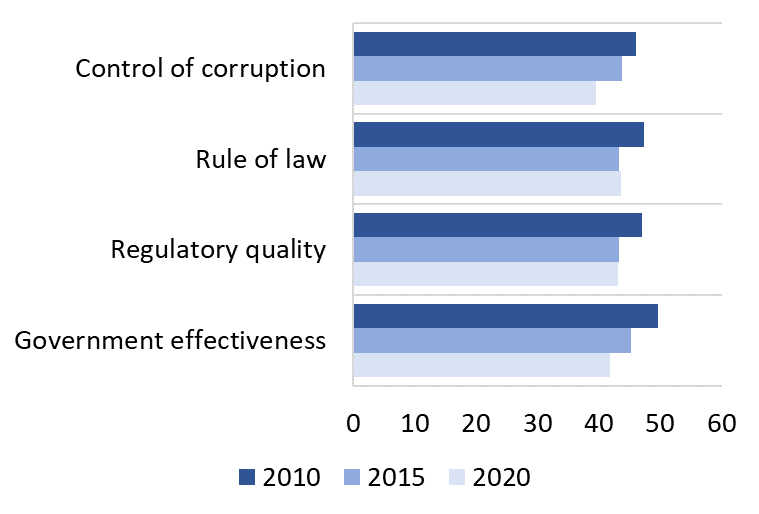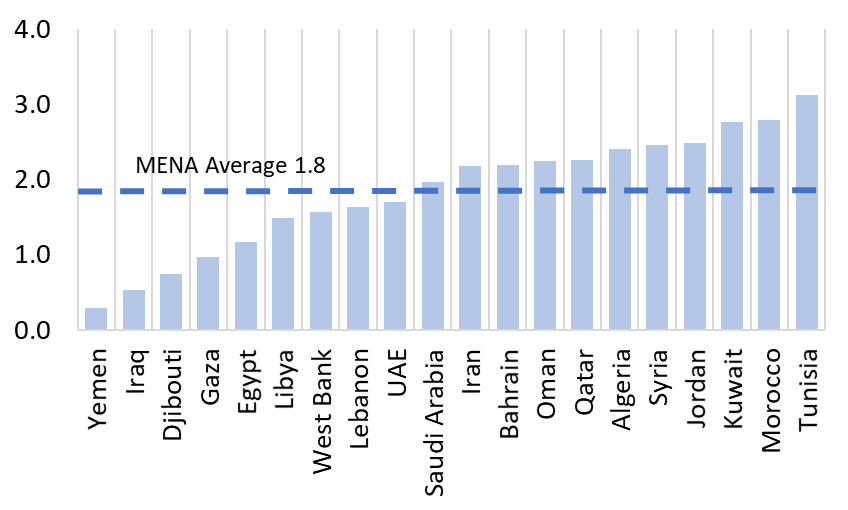 أحد العاملين في الخدمة المدنية / مشروع عام.
أحد العاملين في الخدمة المدنية / مشروع عام.
Public sectors in MENA have struggled to reform for decades. Public sector employees account for 25% of total employment across the region and public sector salaries represent 32% of total government spending – higher on average than any other region of the world. And yet, government performance outcomes in MENA have remained below par compared to other countries.
| Worldwide Governance Indicators Percentile Ranking (0-100) |
|
|
In fact, over the last decade, MENA’s performance across several dimensions of governance has deteriorated. According to the Worldwide Governance Indicators, MENA’s percentile ranking on Government Effectiveness dropped from an already low 50 in 2010 to 42 in 2020. A similar trend was observed in dimensions related to Regulatory Quality (from 47 to 43), Rule of Law (from 47 to 44) and Control of Corruption (from 46 to 40).
Poor governance and public sector performance have real consequences for the lives of MENA’s citizens and has impacted how they view their state. For instance, according to the latest Arab Barometer survey, 58.7% of respondents stated that they were either “dissatisfied” or “completely dissatisfied” with their government’s performance , and only 12.2% said that they had a “great deal of trust” in government. Respondents reported being dissatisfied with the (largely publicly provided) health and education systems in their countries (61.8% and 70.7% respectively) and with how their governments had dealt with Covid-19 (61.9% of respondents felt that their government’s response was either “bad” or “very bad”).
Across the region, MENA’s citizens are demanding more and better from their governments. Reforming the core civil service so that it performs better for citizens and businesses alike is therefore more crucial than ever.
Such a reform will require looking at the machinery of public administration and analyzing how aspects such as recruitment and promotion decisions, training and capacity development programs, and staff performance monitoring and management, can have a positive long-term impact on overall government effectiveness and service delivery.
Unfortunately, many MENA countries score poorly on all counts mentioned above. According to the latest data from the V-Dem Institute, recruitment into the public sector in MENA continues to be driven by political affiliation or socio-economic grouping rather than merit. In 2020, on average, the region scored 1.6 and 1.8 out of 4 on the access to state jobs by political group and socio-economic position indicators respectively, illustrating that a large chunk of the population continues to be shut out of public employment opportunities due to a lack of ‘wasta’ (political and social connections) despite having necessary qualifications.
For those who do access public employment, expectations for job effort remain low because rules relating to performance management exist on paper but not in practice. In addition, promotions are often given out based on seniority rather than merit, and government training and capacity building programs are often de-linked from any real assessment of service delivery bottlenecks or skill gaps.
| Are state jobs equally open to qualified individuals regardless of their association with a political group? 0 Extremely Unequal – 4 Equal |
Are state jobs equally open to qualified individuals regardless of socio-economic position? 0 Extremely Unequal – 4 Equal |
| |
|
| Source: V-Dem 2020 |
|
In response to these challenges, the World Bank has in recent years stepped up its support to MENA countries in areas related to civil service performance.
In Iraq, where the Parliament recently established the Federal Public Service Council to oversee human resource management in the civil service, the Bank is providing technical and capacity building support to help the Council operationalize its newly given mandate. In addition, the Bank is supporting the development of merit-based recruitment procedures for Grade 1-10 technical positions in government.
In Saudi Arabia, our team is working with the Ministry of Human Resources and Social Development to update policies and procedures related to workforce planning; develop updated schemes for talent management and human resource capacity development; and monitor and promote better staff engagement and organizational health in the public sector to improve overall performance.
Over time, whether in a Fragility, Conflict and Violence (FCV) setting such as Iraq or a high-income, resource rich environment such as Saudi Arabia, such reforms should help professionalize the civil service and promote a culture of transparency, performance, and merit across employee groups that can translate into improved service delivery for citizens and businesses.
Improved public sector performance lies at the heart of the citizen-state interface and can help build trust, enhance state legitimacy, and strengthen the social contract. Governments in MENA trying to achieve broader reforms related to the state and economy may be well-served by focusing on this.






Join the Conversation